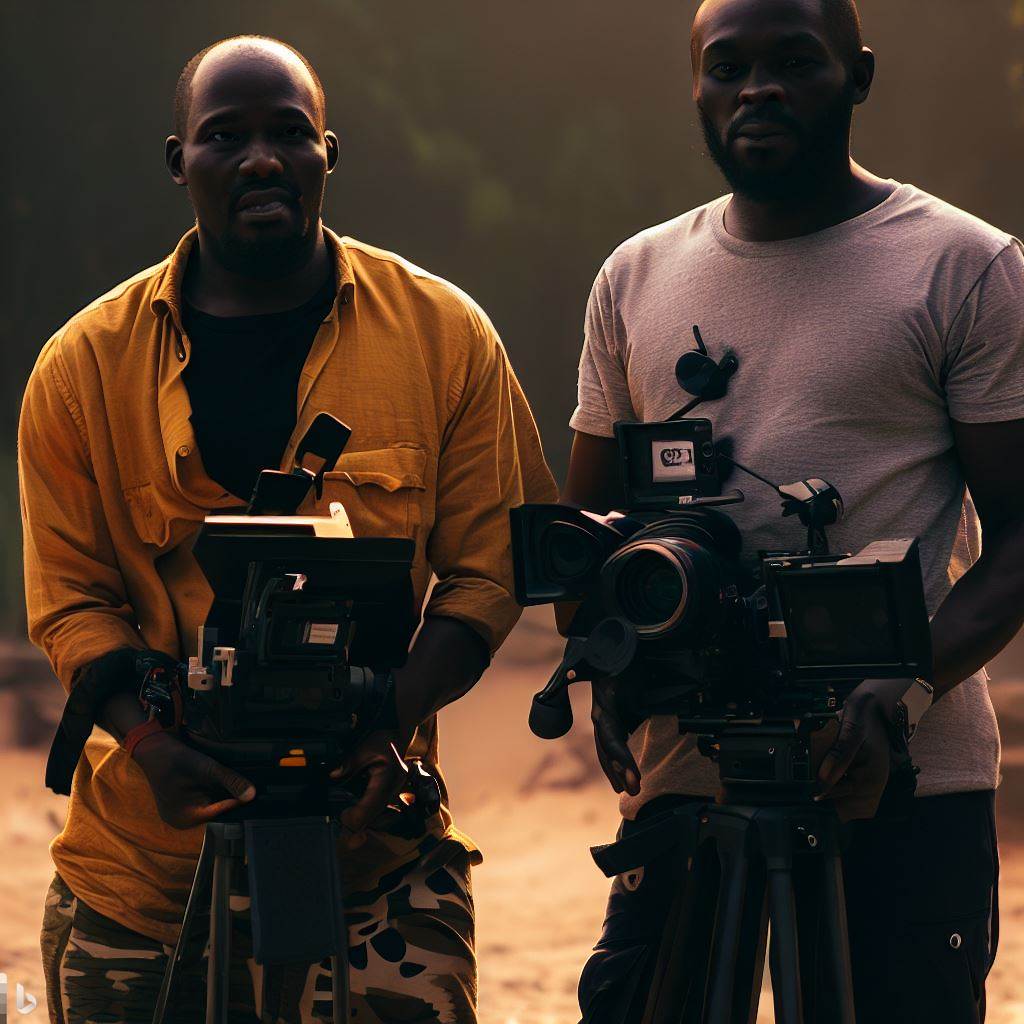Introduction
Scriptwriting is an essential aspect of the Nigerian entertainment industry, which has gained international recognition. It is a medium through which Nigerian stories are brought to life on screens across the globe.
Nigerian scriptwriters, with their unique perspective and storytelling skills, play a vital role in the success and growth of this industry.
The significance of Nigerian scriptwriters cannot be overstated. They are responsible for shaping narratives that showcase the rich culture, traditions, and experiences of the Nigerian people.
Through their work, they provide a platform for the voices of the underrepresented, shedding light on important social issues and cultural nuances.
In this interview, we delve into the mind of a Nigerian scriptwriter, exploring their journey, inspirations, and creative process.
By understanding their perspective, we can gain a deeper appreciation for the complexity and artistry behind Nigerian storytelling.
Through thought-provoking questions and insightful answers, we hope to shed light on the challenges and triumphs faced by Nigerian scriptwriters in an industry that is constantly evolving.
Through this interview, readers will be exposed to the intricacies of scriptwriting and the immense talent within the Nigerian entertainment industry.
We aim to inspire aspiring scriptwriters and provide a glimpse into the world of creativity and imagination that fuels the Nigerian film landscape.
Join us in this illuminating interview, as we delve into the world of a Nigerian scriptwriter and discover the magic that happens behind the scenes.
Background of Nigerian Scriptwriting Industry
A. Overview of the Nigerian film industry (Nollywood)
- Nollywood is the second largest film industry in the world, producing over 2,000 movies annually.
- It emerged in the 1990s and has experienced exponential growth since then.
- Nollywood movies are known for their low budgets, quick productions, and high demand.
- The industry is predominantly focused on producing films for the Nigerian and African markets.
- Nollywood has gained international recognition and has contributed to Nigeria’s cultural identity.
B. Rise of scriptwriting as a career in Nigeria
- In the early days of Nollywood, many films were produced without proper scripts and improvisation was common.
- As the industry grew, the need for professional scriptwriters became evident to improve storytelling and production quality.
- This led to the rise of scriptwriting as a viable career option within the Nigerian film industry.
- Scriptwriters began to receive recognition and respect for their contribution to the success of Nollywood movies.
- Aspiring writers started pursuing scriptwriting courses and workshops to enhance their skills.
C. Importance of Nigerian scriptwriters in shaping the industry
- Nigerian scriptwriters play a vital role in shaping the narratives and themes depicted in Nollywood films.
- They bring their unique perspectives and cultural insights, making the stories more authentic and relatable.
- Scriptwriters also contribute to the development of complex characters and engaging plotlines.
- They collaborate closely with directors, producers, and actors to ensure the vision of the film is effectively translated.
- The success of Nollywood can be attributed, in part, to the talent and creativity of Nigerian scriptwriters.
Basically, the Nigerian scriptwriting industry has emerged as an integral part of Nollywood’s success.
With its rapid growth and increasing demand for quality storytelling, scriptwriters now have more opportunities than ever to make a career in the Nigerian film industry.
Their contributions in shaping the industry’s narratives, characters, and plotlines cannot be overlooked.
As Nollywood continues its global expansion, Nigerian scriptwriters will play a crucial role in further establishing the industry’s reputation and cultural impact.
Read: The Impact of Nollywood on Scriptwriting in Nigeria
Interviewee Introduction
A. Name and background information
The scriptwriter being interviewed is Chinwe Onwubiko, a Nigerian born and raised in Lagos.
Chinwe grew up with a passion for storytelling and writing, which eventually led her to pursue a career in scriptwriting.
She completed her bachelor’s degree in Creative Writing at the University of Lagos, where she honed her writing skills and developed a deep understanding of the power of storytelling.
B. Accomplishments and contributions to the scriptwriting field
Chinwe has made significant contributions to the scriptwriting field in Nigeria and beyond.
Her screenplay for the film “Voices of Silence” won several prestigious awards, including Best Screenplay at the African Film Festival.
Chinwe, a accomplished writer, actively mentors and nurtures young scriptwriters, aiding skill development and industry opportunities.
Her expertise and dedication have earned her a reputation as one of the most talented and influential scriptwriters in Nigeria.
C. Reasons behind choosing scriptwriting as a career
Chinwe always had a natural inclination towards storytelling and writing, making scriptwriting a perfect fit for her.
She believes that scripts have the power to touch people’s hearts, provoke emotions, and create meaningful change in society.
Chinwe finds immense satisfaction in crafting compelling narratives and bringing characters to life on screen.
Her motivation stems from connecting with audiences and eliciting a broad spectrum of emotions through her writing.
Furthermore, Chinwe appreciates the collaborative nature of scriptwriting, enjoying the process of working with directors, actors, and other creatives to bring a story to fruition.
She thrives in the fast-paced and ever-evolving nature of the scriptwriting field, continually pushing herself to explore new storytelling techniques and embrace innovative approaches.
Chinwe is excited about the future of Nigerian cinema and aims to contribute to its growth by creating thought-provoking scripts that resonate with both local and international audiences.
In essence, Chinwe Onwubiko’s passion for storytelling, remarkable achievements in the field, and her genuine love for scriptwriting have solidified her position as a prominent figure in Nigerian cinema.
Her dedication to her craft and her contributions to nurturing young talent make her an inspiration to aspiring scriptwriters.
We can expect great things from Chinwe as she continues to captivate audiences and shape the future of scriptwriting in Nigeria and beyond.
Read: Key Challenges Faced by Nigerian Scriptwriters Today
Challenges Faced by Nigerian Scriptwriters
A. Cultural and societal factors
- Limited portrayal of Nigerian stories: Nigerian scriptwriters often face the challenge of limited opportunities to tell their unique stories due to cultural and societal factors.
- Limited acceptance of local content: Nigerian scriptwriters struggle with the challenge of limited acceptance and appreciation for local content, as there is a strong preference for foreign films and television shows.
- Stereotypes and biases: Nigerian scriptwriters face the challenge of dealing with stereotypes and biases when it comes to portraying their characters and stories accurately.
B. Lack of governmental support and funding
- Insufficient funding: Nigerian scriptwriters often struggle with the challenge of insufficient funding for their projects, making it difficult to produce high-quality films or television shows.
- Lack of government incentives: Nigerian scriptwriters face challenges in the form of limited government incentives or grants, making it harder to sustain their careers and improve the industry.
- Inadequate infrastructure: Nigerian scriptwriters struggle with the challenge of insufficient infrastructure, such as filmmaking equipment and studios, which inhibits their creative process and hampers the quality of their work.
C. Competition within the industry
- Limited opportunities: Nigerian scriptwriters face intense competition for opportunities, as the industry is saturated with talented individuals vying for a limited number of projects.
- Established networks: Scriptwriters in Nigeria face the challenge of breaking into established networks and gaining recognition in an industry where connections play a significant role.
- Copying and plagiarism: Nigerian scriptwriters face challenges related to intellectual property theft, as their work is often copied and plagiarized without proper acknowledgment or compensation.
- Nigerian scriptwriters persist despite challenges, contributing to the entertainment industry.
- They demonstrate resilience and resourcefulness in storytelling.
- Government and industry stakeholders must recognize and nurture local talent.
- Addressing challenges in Nigeria’s entertainment industry is essential for its growth and international recognition.
- Explore cultural and societal factors, promoting and appreciating local content.
- The government should provide funding, incentives, and infrastructure support.
- Protecting intellectual property rights and ensuring a competitive environment is crucial.
Nigerian scriptwriters overcome obstacles and enrich the entertainment industry.
Acknowledging local talent, addressing industry challenges, and safeguarding intellectual property rights are essential for the industry’s growth and international recognition.
Read: The Impact of Nigerian Costume Design in Fashion Industry
Career Insights and Experiences
A. Daily routine and creative process
- As a scriptwriter, my daily routine involves extensive research, reading, and brainstorming for new ideas.
- I dedicate a specific time of the day to write, ensuring I am in a quiet and comfortable environment.
- Before starting a new project, I thoroughly analyze the target audience and the purpose of the script.
- Developing a creative process involves outlining the main plot, characters, and dialogue for the script.
- I believe in the power of collaboration, so I often bounce ideas off my colleagues or seek feedback from them.
- Continuous learning and improvement are crucial, so I spend time studying the works of renowned scriptwriters.
B. Collaboration with directors and producers
- Collaboration with directors and producers is an integral part of the scriptwriting process.
- Once the script is drafted, I present it to the director and producer for their input and suggestions.
- Their feedback helps me refine the script and align it with the overall vision of the project.
- Regular meetings with the director and producer ensure effective communication and a unified creative vision.
- I make necessary revisions to accommodate any changes or specific requirements discussed.
- Working closely with directors and producers allows me to understand their expectations and deliver accordingly.
C. Tips for aspiring scriptwriters in Nigeria
- Never underestimate the power of networking in the Nigerian film industry.
- Join scriptwriting forums and workshops to learn from experienced professionals and exchange ideas.
- Read scripts from different genres to broaden your understanding of storytelling techniques.
- Develop a unique writing voice and style that sets you apart from others.
- Be open to constructive criticism and feedback, as it will only help you improve your writing skills.
- Constantly stay updated with the latest trends and developments in the Nigerian film industry.
- Build relationships with directors, producers, and other industry professionals to increase your chances of getting noticed.
- Be passionate and dedicated to your craft, as success in scriptwriting requires hard work and perseverance.
By following these insights and experiences, aspiring scriptwriters in Nigeria can embark on a successful career in the dynamic world of film and television.
With a disciplined routine, collaborative mindset, and a continuous thirst for learning and improvement, scriptwriters can contribute to the growth of the Nigerian film industry and bring engaging stories to life on screen.
Read: Inspirational Nigerian Costume Designers to Watch in 2023

Scriptwriting Techniques and Strategies
A. Approach to storytelling
- Begin with a captivating opening that grabs the audience’s attention immediately.
- Develop well-rounded and relatable characters that the audience can connect with.
- Use a clear and logical story structure to guide the flow of the script.
- Utilize conflict and tension to create a compelling narrative that keeps the audience engaged.
- Incorporate effective dialogue that conveys emotions and advances the plot.
B. Balancing cultural elements and universal appeal
- Understand the target audience’s cultural background to incorporate relevant elements.
- Find a balance between showcasing cultural uniqueness and maintaining a universal appeal.
- Ensure that cultural references are explained or understood by a wider audience.
- Incorporate themes or issues that resonate across cultures to make the story relatable.
- Seek feedback from diverse perspectives to ensure cultural sensitivity and inclusivity.
C. Techniques for capturing the attention of the audience
- Create an intriguing premise or concept that piques the curiosity of the audience.
- Establish clear stakes early on to make the audience invested in the outcome of the story.
- Use visual storytelling techniques, such as vivid descriptions and compelling imagery.
- Incorporate plot twists and surprises to keep the audience on the edge of their seats.
- Utilize suspense and pacing to maintain a sense of anticipation throughout the script.
- Mastering scriptwriting techniques is crucial for captivating audiences in film, TV, and theater.
- Begin with a gripping opening to intrigue viewers or readers.
- Develop relatable, multi-dimensional characters with unique motivations.
- Maintain a clear, logical story structure, following established frameworks.
- Balance cultural elements with universal appeal for a broader audience.
- Incorporate themes that resonate universally, connecting with diverse backgrounds.
- Engage the audience with intriguing premises and clear stakes.
- Utilize visual storytelling techniques for immersive experiences.
- Employ plot twists, surprises, suspense, and pacing to maintain audience interest.
- Effective scriptwriting creates compelling, memorable stories that leave a lasting impact.
Impact on the Nigerian Film Industry
A. Influence on storytelling and narratives
- Scriptwriters in Nigeria have significantly influenced the way stories are told in Nigerian films.
- They have brought fresh and innovative approaches to storytelling, creating unique and engaging narratives.
- By crafting compelling scripts, these scriptwriters have captivated audiences and kept them hooked to Nigerian movies.
- Their ability to develop well-structured plots and memorable characters has elevated the quality of Nigerian films.
- Through their scripts, Nigerian scriptwriters have contributed to the growth of the local film industry.
- They have been instrumental in attracting both local and international recognition for Nigerian cinema.
- Their storytelling skills have helped shape the identity and reputation of Nollywood as a dynamic industry.
- Scriptwriters have also played a crucial role in preserving and showcasing Nigerian cultural traditions and values through their narratives.
- They have employed storytelling techniques that reflect the rich cultural heritage of Nigeria in their scripts.
- By weaving cultural elements into their narratives, scriptwriters have promoted Nigeria’s cultural diversity and heritage.
B. Conveying social and cultural messages
- Nigerian scriptwriters have used their craft to address important social issues affecting the country.
- They have utilized the power of storytelling to raise awareness about various societal challenges.
- Scriptwriters often tackle topics such as corruption, poverty, gender inequality, and youth empowerment in their scripts.
- By shining a light on these issues, they contribute to the national dialogue and promote positive social change.
- The ability of scriptwriters to convey meaningful messages in an entertaining manner has made Nigerian films impactful.
- They have created a platform for discussions on pressing social issues and encouraged viewers to take action.
- Through their scripts, scriptwriters have also challenged societal norms and sparked conversations about cultural practices.
- Their work has helped challenge stereotypes and promote inclusivity and tolerance in Nigerian society.
- Nigerian scriptwriters have been influential in shaping public opinion and advocating for social justice through their narratives.
- By addressing social and cultural themes, they have positioned Nigerian cinema as a powerful medium for societal transformation.
C. Contribution to the growth and success of Nollywood
- The contribution of Nigerian scriptwriters to the growth and success of Nollywood cannot be overstated.
- Their scripts form the backbone of the Nigerian film industry, laying the foundation for successful productions.
- With their creative talent, scriptwriters attract investors and filmmakers to collaborate on Nigerian projects.
- The popularity and demand for Nigerian films on the international stage are often a result of exceptional scripts.
- Scriptwriters play a significant role in ensuring that Nigerian movies resonate with both local and global audiences.
- They adapt their storytelling techniques to appeal to diverse viewers and bridge cultural gaps.
- The growth of Nollywood as a billion-dollar industry is attributable to the exceptional talent of Nigerian scriptwriters.
- Their ability to create scripts that combine entertainment with social messages has fueled the success of Nigerian cinema.
- Scriptwriters constantly push boundaries and strive for excellence, propelling Nollywood to new heights.
- Without the contribution of scriptwriters, Nollywood would not have achieved its influential status in the film industry.
Delve into the Subject: Insider’s Guide to Music Licensing in Nigeria
Conclusion
Recap of the interview highlights
The interview provided a glimpse into the life of a Nigerian scriptwriter, showcasing their passion for storytelling and the challenges they face in the industry.
Emphasize the significance of Nigerian scriptwriters
Nigerian scriptwriters play a crucial role in the country’s booming entertainment industry, creating stories that resonate with the diverse Nigerian audience.
Closing thoughts and final remarks:
The interview shed light on the creativity and resilience of Nigerian scriptwriters, inspiring aspiring filmmakers to pursue their dreams and contribute to the growth of the industry.




